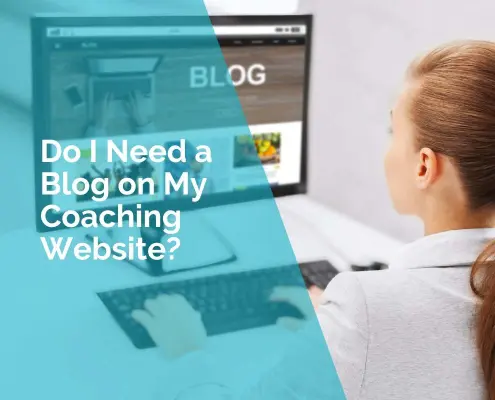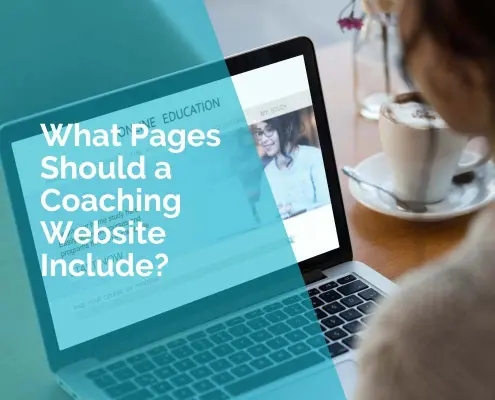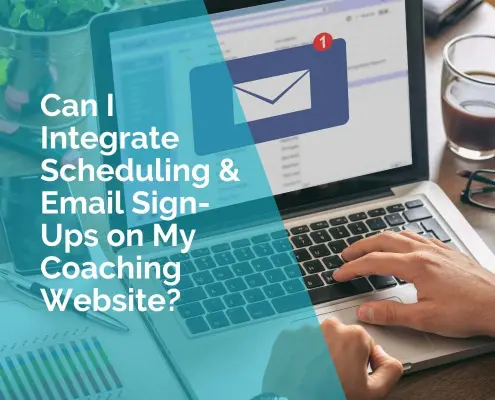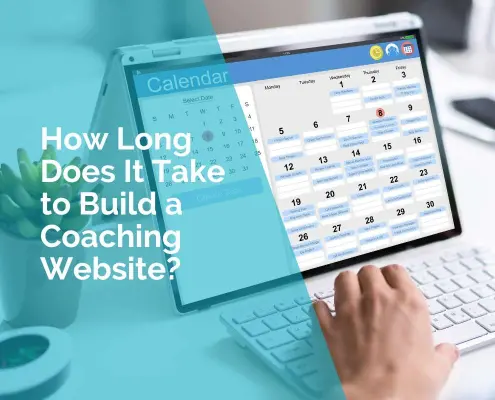Coaching and Consulting Website FAQs: Everything You Need to Know
Thinking about building or improving your coaching or consulting website? You’re not alone. Coaches and consultants often have the same key questions — from choosing the right platform and deciding what to include, to understanding costs, timelines, and how to attract clients online.
This FAQ resource brings together answers to the 20 most common questions we hear from coaches and consultants planning their websites. Whether you’re creating your first site or redesigning an existing one, you’ll find practical tips, examples, and links to more in-depth guides.
We cover essentials like design best practices, SEO, branding, and lead generation, along with behind-the-scenes insights from working with hundreds of small businesses. Use the search or scroll through the questions to find the answers you need — and if you’re ready to take the next step, explore our website design services for coaches and consultants.
Frequently Asked Questions
Do coaches need a website?
Yes – today, your website is your online storefront and operates 24/7 to showcase your services.
A coaching website is more than just an online brochure — it’s the foundation of your digital presence. Without one, potential clients may never find you or may doubt your credibility. Most people now start their search for services online, and if they can’t learn about you quickly, they’ll move on to someone who has a professional, easy-to-navigate site.
A well-designed coaching website works while you sleep. It explains who you are, the results you deliver, and how clients can take the next step with you. This means you can be “available” around the clock, even when you’re in client sessions or taking time off. It also allows you to control your brand message instead of relying solely on third-party platforms.
For a deeper look at how a website builds authority and trust for coaches, see Website Design for Coaches & Consultants: The Ultimate Guide.
What should a coaching website include?
Essential pages include: services overview, About/Bio, testimonials, and a clear contact or “Book a Call” button.
An effective coaching website contains specific elements that help visitors decide if you’re the right coach for them. At a minimum, you’ll want a homepage that clearly communicates your niche and value, an About page that builds trust and connection, a Services or Programs page that explains your offers, and a Contact page that makes getting in touch effortless.
Additional credibility builders include a testimonials or success stories page, professional photos, and a resources/blog section for valuable, evergreen content. Your site should also have clear calls-to-action (CTAs) on every page, such as “Book a Discovery Call” or “Download My Free Guide,” so visitors know the exact next step to take.
Want to learn more – check out: Essential Website Features for Coaches: A Guide to Conversion-Oriented Design
Which platform is best for a coaching website?
For most coaches, WordPress is the best platform because it’s highly customisable, scalable, and works well with booking tools, email marketing, and SEO.
While drag-and-drop builders like Wix and Squarespace can be quick to set up, WordPress offers the most flexibility, long-term control, and potential for growth — especially for coaches planning to expand their services or online presence over time. With thousands of themes and plugins, you can add scheduling systems, lead capture forms, membership areas, or even online course platforms without switching to a new site.
WordPress also gives you full ownership of your content and more control over SEO, which can be harder to achieve on closed systems. That means you can optimise your site for the exact keywords your ideal clients are searching for, improve your visibility on Google, and adapt your site as your business evolves.
If you prefer a completely hands-off experience, you can still have a WordPress site professionally designed and maintained, so you get all the benefits without the learning curve. For more tips on designing a coaching site that converts, see Website Design for Coaches & Consultants: The Ultimate Guide.
How much does a coaching website cost?
A professionally designed coaching website typically costs between $1,000 and $5,000, with advanced, custom sites starting at $10,000 or more.
The cost of a coaching website depends on several factors, including whether you DIY or hire a professional, the number of pages, and the features you need. A professionally built starter site with a few core pages (Home, About, Services, Contact) will usually fall in the $1,000–$5,000 range. If you want advanced features like a membership portal, custom booking integrations, or e-commerce, you can expect the investment to start from $10,000 and go up.
It’s also important to factor in ongoing costs such as domain registration, hosting, security updates, and website maintenance — these can range from $200 to $1,000 per year, depending on the provider and level of support you choose. While DIY website builders may seem cheaper at first, they often involve trade-offs in design flexibility, SEO control, and time spent troubleshooting.
When budgeting, think beyond just “launch day” — a good coaching website is an asset that should evolve with your business, generate leads, and pay for itself many times over. For more details on what affects pricing and how to choose the right package, see Website Design for Coaches & Consultants: The Ultimate Guide.
How long does it take to build a coaching website?
A simple coaching website can be completed in about 2–3 weeks if your content is ready, while complex projects may take 4–6 weeks or longer.
The timeline for building a coaching website depends on how prepared you are with text, images, and branding, as well as the scope of the project. If you already have all your content and branding elements finalised, a straightforward site with a few core pages can often be designed, built, and launched within 2–3 weeks.
Larger or more customised projects — for example, those involving a membership portal, multiple service pages, or advanced integrations — typically require 4–6 weeks or more. Delays often happen when content is still being written during the design process or when feedback takes longer than expected.
To keep your project on track, set clear milestones for providing materials and approving designs, and maintain consistent communication with your designer. This ensures the process stays efficient and you can launch your site as planned.
Should I build my coaching website myself or hire a professional?
DIY can work if you have the time, skills, and patience, but hiring a professional ensures a polished, strategic site that’s built to convert.
Building your own site can save money upfront, and platforms like Wix or Squarespace make it relatively easy to get started. However, the trade-offs often include limited design flexibility, less control over SEO, and a significant time investment. If you’re already busy running your coaching business, DIY can become a frustrating distraction.
Hiring a professional web designer costs more initially but gives you a site that’s tailored to your brand, structured for conversions, and technically sound. An experienced designer can also advise on strategy, integrate the right tools, and ensure your site works flawlessly across devices. In many cases, the higher-quality results mean you start attracting and converting clients faster — which can offset the extra investment.
For help deciding what’s right for you, see To DIY or Not to DIY: Should I Design My Own Website?
How do I write a compelling “About Me” page for my coaching website?
Open with who you help and how, share your story and credentials, and connect it back to your client’s needs.
Your About Me page is one of the most visited parts of your site, but it’s often misunderstood. Instead of writing a full autobiography, focus on telling a story that makes your ideal client feel understood and confident in choosing you. Start with a hook that immediately signals who you help and what transformation you provide. Follow with your credentials, experience, and a brief personal background that makes you relatable.
Balance professional credibility with personality. Include at least one professional photo, ideally one where you’re engaging in your work or speaking with clients. End with a call-to-action — for example, inviting visitors to book a discovery call. This ensures the momentum you’ve built through storytelling leads to action.
Learn more – How to Write a Coaching Bio that Sells [Complete Guide 2025]
Should I include pricing on my coaching website?
If you offer fixed packages, displaying pricing builds trust; for customised services, focus on value and invite visitors to contact you.
Transparency is a trust-builder. When you list prices, you filter out people who can’t afford your services, allowing you to spend time with more qualified leads. This works well if you offer fixed coaching packages, such as a 12-week program for a set price.
If your services are highly customised, publishing a single price can be misleading. In that case, focus your site content on the value and outcomes you deliver, then prompt visitors to book a call for a tailored quote. Whether you list prices or not, make the next step clear so there’s no uncertainty about how to work with you.
See our Coaching Packages & Pricing Guide for more on setting and presenting your fees.
Can I integrate online scheduling and email sign-ups on my coaching website?
Yes – tools like Calendly for booking and Mailchimp or ConvertKit for email capture can be integrated into most websites.
Integrating scheduling and email capture is one of the easiest ways to make your site work for you 24/7. Scheduling tools like Calendly, Acuity, or Book Like A Boss allow visitors to book discovery calls or sessions directly from your site, automatically updating your calendar and sending reminders.
Email marketing platforms such as Mailchimp, ConvertKit, or ActiveCampaign can be connected to sign-up forms or lead magnet downloads, helping you grow a list of potential clients to nurture over time. These integrations improve user experience, save you admin time, and keep your marketing running in the background.
Do I need a blog on my coaching website?
A blog isn’t mandatory, but publishing even 1–2 articles a month can boost your SEO, showcase your expertise, and provide shareable content.
Extended answer:
Blogging can be a highly effective marketing tool for coaches. Regular, helpful posts can improve your Google rankings, give potential clients a reason to stay on your site longer, and position you as an expert in your niche. Your blog can answer common client questions, share case studies, or provide tips that showcase your approach.
Even if you only post occasionally, your blog becomes a library of resources you can share in newsletters or on social media. If writing isn’t your strength, consider short posts, interviews, or outsourcing content creation. Just remember: quality matters more than quantity — one excellent post a month beats four rushed ones.
For tips on creating content that resonates with your audience, see How to Create Content for Your Coaching Website.
How can I optimise my coaching website for SEO?
Focus on keyword-rich, client-focused content, optimise meta titles and descriptions, and ensure your site loads quickly and works on all devices.
SEO (Search Engine Optimisation) is what helps your website show up when potential clients search for your services. Start by identifying the keywords your ideal clients use — such as “career coach in Sydney” or “life coaching for confidence” – and naturally integrate them into your page titles, headings, and text.
Optimise your meta titles and descriptions for each page, as these are what appear in Google search results. Make sure your site loads quickly, is mobile-friendly, and includes internal links between related pages. Publishing fresh content – for example, answering common client questions in blog posts – keeps your site relevant and signals to search engines that your content is current.
How can a coaching website convert visitors into clients?
Use clear calls-to-action, persuasive copy, and social proof to guide visitors toward booking a call or buying a program.
A high-converting coaching website starts with a clear value proposition: let visitors know who you help, how you help them, and what results they can expect. Use persuasive copy that speaks to your client’s pain points and aspirations, supported by social proof such as testimonials or case studies.
Every page should include a call-to-action, whether that’s booking a discovery call, signing up for a lead magnet, or purchasing a package. Simplify navigation so visitors can find what they need quickly, and remove unnecessary distractions from your most important pages.
For more strategies, see Website Design for Coaches & Consultants: The Ultimate Guide.
What common mistakes should I avoid on my coaching website?
Avoid unclear messaging, cluttered layouts, poor mobile experience, and generic imagery that doesn’t reflect your brand.
A coaching website can look beautiful but still fail if visitors can’t quickly understand what you do and how to take the next step. Avoid vague headlines, overly complex navigation, and pages crowded with too much information. Make sure your site is mobile-friendly and loads quickly — slow pages can cause visitors to leave.
Another common pitfall is relying on generic stock photos instead of showing authentic images of yourself and your work. This is especially important in coaching, where personal connection matters. Finally, always include a clear call-to-action so visitors know exactly how to work with you.
How do I ensure my coaching website reflects my personal brand?
Use consistent colours, fonts, imagery, and messaging that align with your personality, values, and coaching style.
Your website is often the first interaction someone has with your business, so it should instantly convey who you are and what you stand for. Start with a colour palette and typography that reflect your coaching style — calming tones for wellness coaching, bold colours for high-performance coaching, etc.
Include professional photos of yourself that show your personality and approach, and write in a voice that’s authentic to you. Use your brand values to guide what you include (and exclude) from the site. Every design choice should help attract the kind of clients you most want to work with.
Find out more at Building a Personal Brand as a Coach: Where to Start
Should I include client testimonials on my coaching website?
Yes – testimonials build trust and help potential clients see the results you’ve delivered for others.
Testimonials provide social proof, which is one of the most powerful tools for building credibility online. Featuring quotes, success stories, or short case studies shows visitors that your coaching produces real, positive outcomes.
Place testimonials strategically — on your homepage, service pages, and near calls-to-action — so they reinforce your message at key decision points. For maximum impact, include the client’s name, photo, and specific details about their transformation (with permission). Video testimonials can be especially persuasive.
Does my coaching website need to be mobile-friendly?
Yes — with over 70% of web traffic now on mobile devices, your site must be responsive to look and function well on all screens.
Extended answer:
A mobile-friendly website automatically adjusts to fit the device it’s viewed on, whether that’s a phone, tablet, or desktop. This ensures your content is easy to read, buttons are easy to tap, and images scale correctly without slowing down your site.
Google uses mobile-first indexing, meaning it primarily evaluates the mobile version of your site for search rankings. If your site isn’t mobile-optimised, you risk losing both visitors and search visibility. Regularly test your site on different devices and screen sizes, and work with a designer who prioritises responsive design.
For more on essential design features, see Essential Website Features for Coaches: A Guide to Conversion-Oriented Design.
Do I need professional photos for my coaching website?
Yes — high-quality photos of you help build trust, create connection, and make your website look more professional.
As a coach, you are the face of your business. Potential clients want to see who they’ll be working with, and professional photography instantly raises your credibility. Use a mix of headshots, lifestyle images, and action shots that show you in your element — whether that’s coaching, speaking, or working with clients.
If a professional photoshoot isn’t possible right now, use the best quality images you can and plan to upgrade later. Avoid blurry, poorly lit, or overly staged stock photos. Real, relatable images help potential clients feel they already know you before they reach out.
What legal pages or disclaimers do I need on my coaching website?
At minimum, include a Privacy Policy, Terms & Conditions, and any disclaimers relevant to your coaching niche.
Legal pages protect your business and build trust with visitors. A Privacy Policy outlines how you collect and use personal data, which is a legal requirement in many countries if you use contact forms, cookies, or email marketing. Terms & Conditions set the rules for using your site and help limit your liability.
If your coaching touches on sensitive areas such as health, finance, or career advice, a Disclaimer can clarify that your services are not a substitute for professional medical, legal, or financial advice. You may also need a Cookie Notice to comply with privacy regulations. These pages are typically linked in your site’s footer so they’re always accessible.
How can I use my coaching website to generate leads or grow my email list?
Offer a valuable lead magnet in exchange for email addresses, and promote it with clear, visible calls-to-action throughout your site.
A lead magnet could be a free guide, checklist, mini-course, or quiz that solves a problem for your ideal client. Make it highly relevant to your coaching niche and place opt-in forms in multiple spots on your site, such as the homepage, blog posts, and dedicated landing pages.
Once someone joins your email list, nurture them with helpful, engaging content that builds trust and keeps you top of mind. Over time, you can offer your coaching services or programs directly to this audience.
For more lead generation strategies, see How to Find New Clients as a Coach.
Should I include videos on my coaching website?
Yes – videos can quickly build trust, showcase your personality, and keep visitors on your site longer.
A short welcome video on your homepage or a personal message on your About page helps visitors feel connected to you before they even book a call. You can also use videos to explain your coaching process, share client success stories, or provide quick tips related to your niche.
Videos increase engagement and time spent on your site, which can indirectly benefit your SEO. Keep them professional, concise, and focused on delivering value. Hosting them on YouTube or Vimeo and embedding them on your site can also help with load speed.
Make Your Website Work for You!
Book your free strategy session with me today and discover how tailored web design can transform your coaching website.
Designing a coaching or consulting website is about more than just looking good online — it’s about creating a tool that works for you every day, attracting the right clients and guiding them to take action. The questions we’ve covered here represent the challenges and decisions most coaches and consultants face, from the early planning stages to ongoing optimisation.
Whether you’re deciding on a platform, working out your budget, or fine-tuning your content for conversions, the key is to keep your audience at the centre of every decision. Think about the clients you most want to work with: what do they need to see, feel, and understand when they land on your site? Every page, image, and call-to-action should serve that goal.
If you’ve gone through these FAQs and realised you’re ready for expert help, we’d love to work with you to create a website that reflects your brand and delivers real results. Our website design services for coaches and consultants are tailored to the needs of service-based businesses — blending strategy, design, and technical know-how to give you a site you’ll be proud to share.
Still have a question we haven’t covered? Get in touch and let’s talk about your vision. The sooner you have a website that’s working hard for your business, the sooner you can focus on what you do best coaching and consulting.

The end result? Professional, custom-made sites that give your business the extra oomph it needs to stand out from the competition and make an impact.
Whether you’re a brand-new business or an established one ready to improve your digital presence, Ivana makes it easy to get your business online very quickly. Her websites are professional, tailored to fit your budget, and give your business a serious boost.
Download your FREE copy of “Ultimate Website Design Secrets Blackbook – 10 Bulletproof Strategies for Designing an Outrageously Successful Website”












